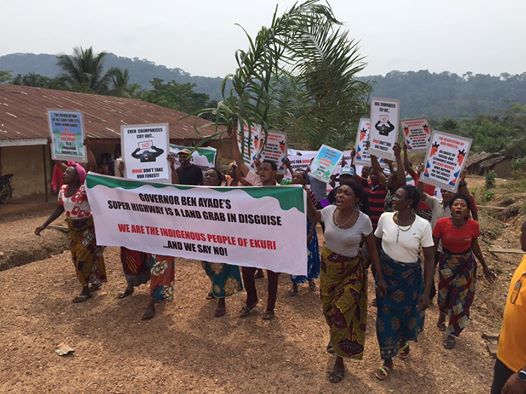Since history is no longer offered as a subject in Nigerian schools, do not expect young Nigerians to know that parts of their country’s rainforest in the state of Cross River are older than the valuable and world-renowned Benin Ivory Masks, and Ife Bronzes in museums and private custodianship around the world. Their parents are not better informed either, being the victims of folk tales and syllabuses that describe tropical forests in frightening metaphors, practically as the impenetrable jungle abode of man-eating animals, cannibal head-hunters, and evil spirits.

In one Marrakech conference hall, the Nigerian president was calmly declaring the resolve of his government to ensure that policies will be put in place to address climate change and make Nigeria emerge as one of the world’s best examples of how reducing emissions can benefit the environment and the economy.
Nigeria is among the most vulnerable African countries to global warming, with rising sea levels and coastal erosion, deforestation and desertification as principal concerns. Halting the rate of deforestation of tropical forests in Nigeria, which between 2000 and 2005 was as high as 11% per year, and promoting reforestation and afforestation can also be key mitigation efforts.
In the second conference hall, Governor Ayade of Cross River State was outlining details of what he describes as a “digital superhighway”, to cross the entire length of the last rainforests in Nigeria. The president and the governor belong to different political parties. But the pair easily formed a coalition to launch the superhighway construction through the Cross River National Park, some months ago; well before the submission by the proponents of a comprehensive environmental and social impact assessment for the project.
The impact assessment document is still awaiting the awkwardness of approval from the Federal Ministry of Environment, because the widely-held belief in Nigeria is that President Buhari, a rather ethically correct personality, has since regretted his association with the superhighway, and the Ministry of Environment now finds itself zig-zagging and playing damage control politics.
How a government can start the anthem of a green agenda, but also join the refrain for forest degradation is a shameless, discordant rendition that brings Nigeria into ridicule before the international community. Is a forest estate, internationally famous for its high profile and endemic species set for destruction by the endemic corruption in Nigeria?
By the nature of its federated configuration, these incongruent perspectives of conservation and exploitation of forests in Nigeria mutate, rotate and gather momentum from ecological to economic and to political and conflict proportions. Many rural and community development projects in Nigeria fail, simply because federal and state governments are unable to clarify important issues of subsidiarity and the dualisms of land tenure, in addition to a lack of coherent and inclusive policies.
Colonialism, and the subsequent Amalgamation of Northern and Southern Nigeria Protectorates in 1914, cut through, and opened the belt of coastal rainforest that separated the West African savannah and the Atlantic Ocean. In Nigeria, these forests were actually more sustainably managed by communities, through customary norms before the advent of a centralized and planned economic development.
The oil boom in the 1980s set the cat among the pigeons and drove the last nail in the coffin of the agriculture, forestry and fisheries sectors in Nigeria. With the recent decline of oil revenues, the resurgence in logging forests is not only to make way for superhighways, but also to make money that disappears into private accounts.
Forest-dependent communities in Nigeria are poor people, and depend overwhelmingly on natural resources for their income. They are voiceless within a cosmetic three-tier system of governance that neither guarantees decentralisation of political authority, nor devolution of fiscal control. The poverty-environment nexus is one of many causative factors of ecosystems degradation in the country. But because this feeling is growing, Nigeria lives in a dangerous belief and primitive economic theory that poverty must first be eradicated in order for the environment to be better managed.
The small conservation lobby in Nigeria, on the other hand has been unable to bring convictive argument, and demonstrate the intrinsic, economic, health and heritage values of forests. Why have we not seen cost-benefit analyses that argue the case for forest conservation against infrastructure development and superhighways? Without evidence-based facts and figures, it is easy for ignorant and misinformed politicians to lampoon conservationists as arrogant anarchists that have no tangible solutions to the problems of Nigeria.
By Ako Amadi (Executive Director, Community Conservation & Development Initiatives)
